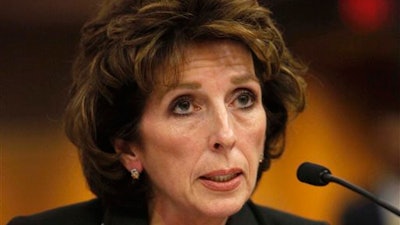
SAN FRANCISCO (AP) — The chancellor of the University of California's Davis campus was put on paid leave amid an uproar over her service on corporate boards and the school's hiring of consultants to improve its image online, following the widely criticized pepper-spraying of protesters by campus police, the university's president announced.
UC President Janet Napolitano plans to appoint an independent investigator to examine the "serious and troubling" questions raised by the actions of Chancellor Linda Katehi and to determine if they violated any university policies, Napolitano's office announced in a statement Wednesday.
In the meantime, Napolitano has removed Katehi from the post she has held for nearly seven years until the inquiry is completed. The campus provost, Ralph Hexter, will fill the chancellor's shoes on an acting basis.
Watch: How to Scrub Yourself from the Internet
"I am deeply disappointed to take this action," Napolitano said in the statement. "But Davis is a strong campus, nationally and internationally renowned in many academic disciplines. I'm confident of the campus's continued ability to thrive and serve California students and the Davis community."
Katehi did not immediately reply to emails seeking comment.
Along with probing whether Katehi has been truthful about her role in the hiring of the online image consultants, the investigation will evaluate if there were irregularities surrounding the hiring and compensation of three of her close relatives, Napolitano said in a letter to Katehi released by the president's office.
Katehi's husband is a chemical engineering professor at Davis, while her daughter-in-law works as chief of staff to the vice-chancellor for student affairs. Her son is a graduate student in epidemiology.
Chief among the potential conflicts of interest about which Napolitano said she is concerned was a raise of over $50,000 and series of promotions the daughter-in-law received over 2 ½ years while reporting to an administrator who in turn reported to the chancellor. Katehi recommended that the vice-chancellor's pay go up by 20 percent during the same period, according to the letter.
Napolitano also expressed concern that the academic program where Katehi's son has a paid research position was put under his wife's supervision and that student fees may have been used inappropriately to finance the move.
"You have verbally assured me that all matters relating to the employment of your husband, son and daughter-in-law have been consistent with policies and procedures, but documents and other information appear contrary to that assurance," Napolitano wrote to Katehi.
Napolitano's announcement ended two days of tense speculation at the Davis campus over Katehi's status.
A petition to Napolitano circulated among faculty members and signed by more than 300 professors earlier Wednesday stated they believed Napolitano had asked Katehi to resign and voiced objection to "this peremptory action carried out without any consultation."
Katehi added to the intrigue with a midday email to her deans and vice-chancellors in which she said she was "100 percent committed" to staying on as chancellor.
"I very much look forward to continuing to lead the campus to greater levels of success and excellence in the future," she wrote.
Katehi, 62, an electrical engineer who has advocated for women in the sciences, came under fire early in her tenure at Davis when campus police officers used pepper spray on seated demonstrators during a November 2011 Occupy movement protest.
The action received global attention because of widely circulated videos and photos of the cringing demonstrators getting sprayed.
The Davis Faculty Association called for Katehi's resignation for ordering police to dismantle the protesters' tent city. An independent investigation later criticized her for demonstrating ineffective leadership leading up to and during the incident, which sparked a series of campus reforms.
Although Katehi weathered the crisis, calls for her resignation resurfaced after The Sacramento Bee reported in March that she had accepted a seat on the board of a for-profit college company the federal government is suing and previously earned hundreds of thousands of dollars as a director for a textbook publisher.
Student protesters upset by what they perceived as a conflict of interest spent five weeks camped outside her office, staying there even after Katehi said she would donate some of the proceeds from her service on the board of textbook company John Wiley & Sons to a scholarship fund.
Pressure for her to quit continued to mount when The Bee reported the campus had spent at least $175,000 on Internet search optimization consultants who promised to diminish online references to the pepper-spray incident so the public would get a more favorable image of Davis.
In a statement last week, Katehi apologized for "a series of highly publicized missteps" that she acknowledged had overshadowed the university's accomplishments and "been a setback to our reputation and hard-earned prestige."
She disputed, however, the idea that her administration had tried to bury the pepper-spray incident by working with the search optimization firms and investing more than $2.6 million on advertising and campus outreach.
"Because of the importance of philanthropy to UC Davis and the need to make sure those searching for information about the university get a complete picture, we needed to do a better job telling the world about the university's extraordinary achievements," she said. "So we did what any organization in a similar situation would do; we sought to strengthen our communications capabilities."
In her letter to Katehi, Napolitano said the chancellor's leave would last at least 90 days and could be extended by the university's governing board.
UC Davis enrolls about 27,000 undergraduates and 4,600 graduate students at a campus 18 miles from Sacramento.






















